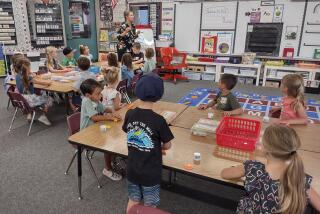Picking on Little Kids ...
- Share via
The recommendation of Gov. Arnold Schwarzenegger’s California Performance Review to save money by having children start kindergarten later has triggered a raging debate. Unfortunately for the state budget, doing the shift correctly won’t save a penny. Doing it cheaply could undermine the futures of some children, especially those from families that don’t speak English.
Kindergarten isn’t about cookies, milk and naps anymore, and California should stop treating it that way. The state should make the crucial year compulsory and join the 45 other states that require children to turn 5 before they start kindergarten. It should also widely offer free preschool, especially for those who need it most.
The modern kindergarten is like first grades of old, complete with work sheets and phonics drills. Yet California allows children to skip the year and enroll in first grade with no preparation. State education officials have no idea how many parents choose not to put their children in kindergarten, though old, unofficial estimates put the figure at 5% to 9% -- and that’s way too high. Education reform that rearranges curriculum and debates textbooks but ignores enrollment in the increasingly important first year of school is missing something fundamental.
Unfortunately, the California Performance Review team got lost in the trees and missed the forest.
The review team, whose aim was to streamline state government and save money, recommended requiring children to turn 5 by Sept. 1, the usual beginning of the school year, to enter kindergarten. The current requirement is that they turn 5 before Dec. 2.
The change makes some educational sense. Kindergarten teachers already are required to do the near impossible: Give very young children a full dose of academics while adjusting them to the rules and routines of school and exposing many of them to English for the first time -- all in half a school day. With 4-year-olds, many of whom have yet to develop the hand coordination to even wield a pencil, this can be a recipe for early failure.
Yes, each child is different, and some are more than ready at an earlier age. But public schools are based on norms, and studies show that the average 4-year-old is less ready for school -- socially, behaviorally or academically -- than a 5-year-old. That will be especially true as more kindergartens morph into full-day programs. Los Angeles is rolling out its own full-day kindergartens over the next few years.
Where the review board makes its mistake is not in excluding some younger children but in failing to plow the savings back into English-immersion programs for preschoolers. The initial $660-million statewide savings from delaying kindergarten will be blown on remedial education and, ultimately, lost economic opportunity if more children fail as soon as they hit kindergarten, stumbling in English and unready to learn.
More to Read
Sign up for Essential California
The most important California stories and recommendations in your inbox every morning.
You may occasionally receive promotional content from the Los Angeles Times.










